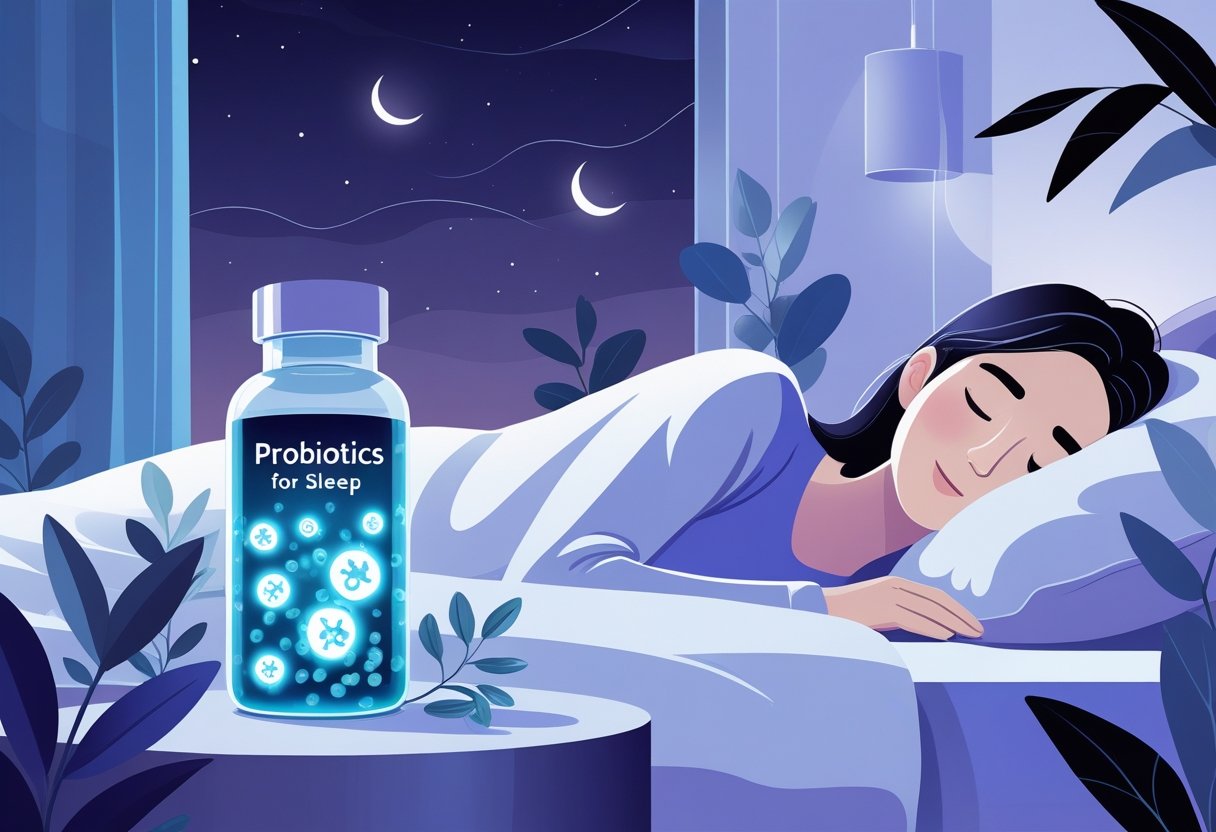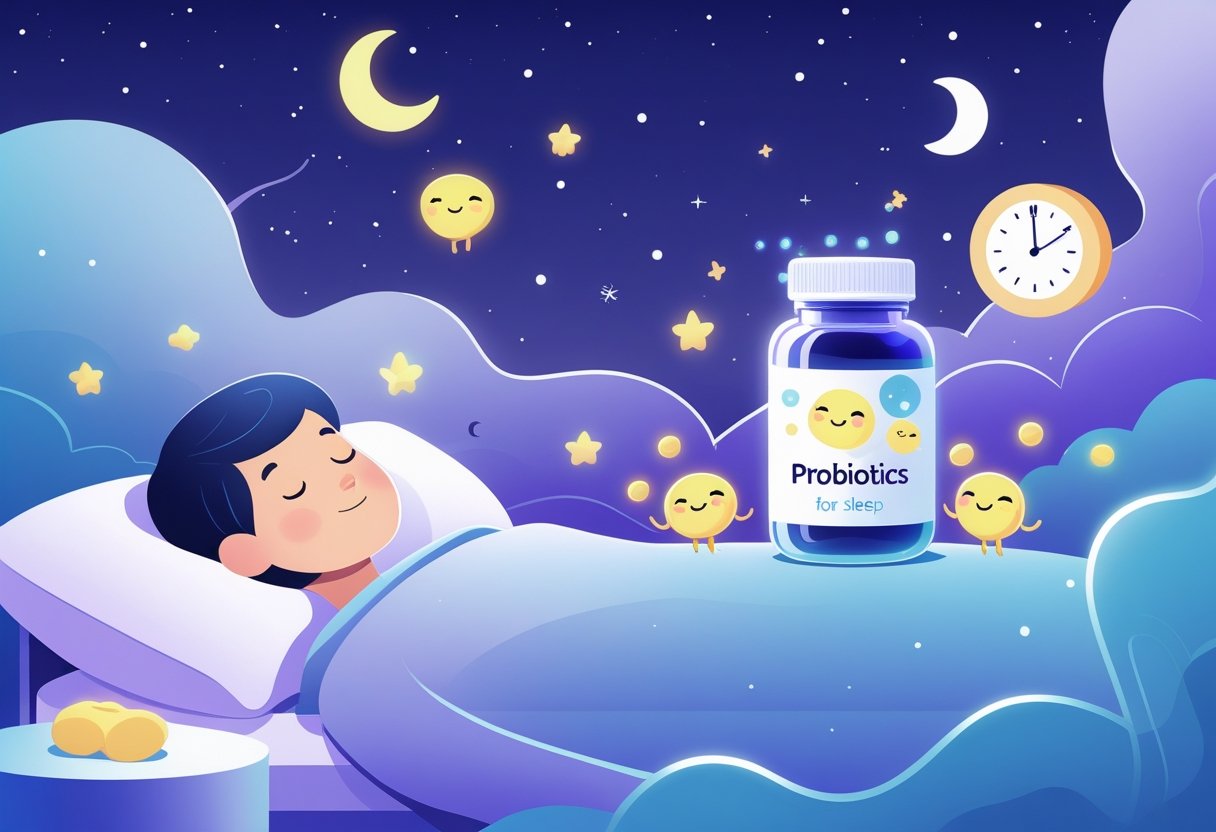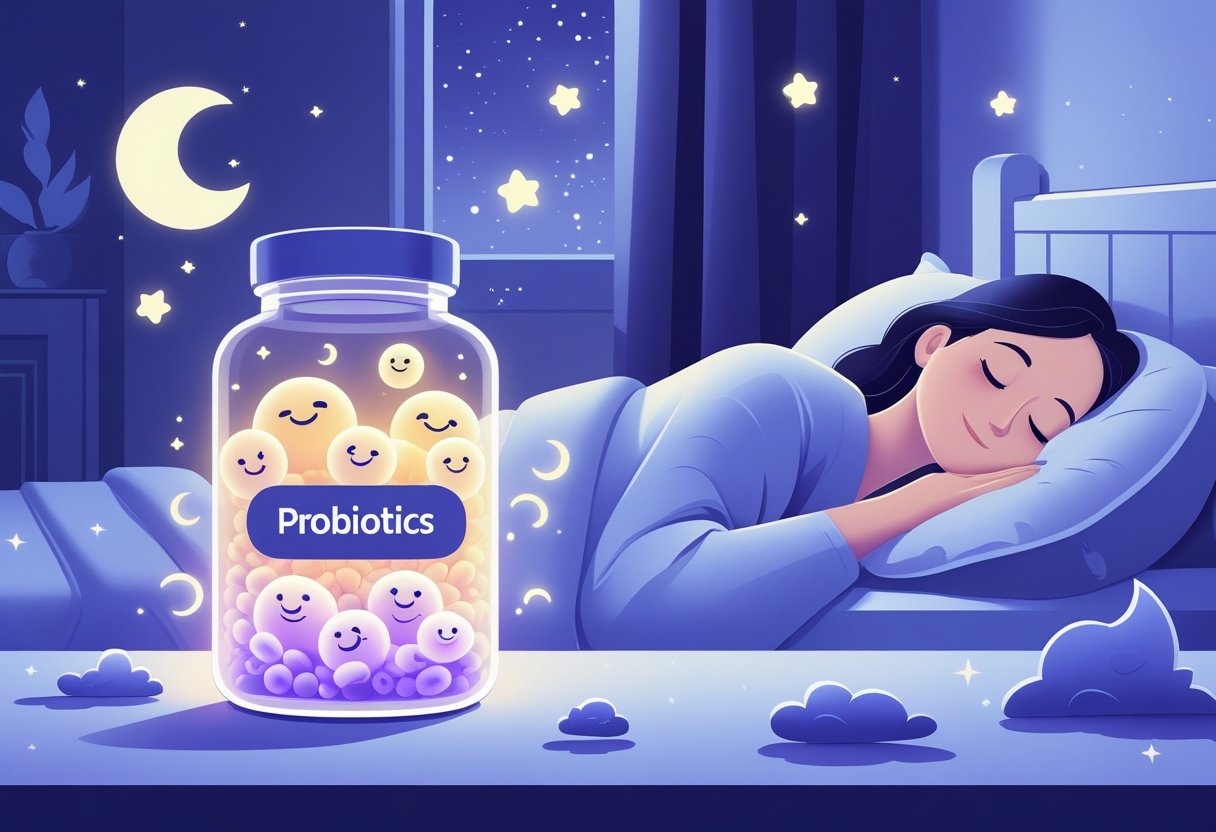Many people struggle with sleep problems and seek natural ways to improve rest. Recent studies show that probiotics, good bacteria found in certain foods and supplements, can improve sleep quality. They may shorten the time it takes to fall asleep and minimize disturbances at night, which results in better overall rest.
The connection between gut health and sleep has become increasingly clear. Probiotics affect the gut microbiome, which influences mood and sleep patterns. When the balance of gut bacteria stays healthy, probiotics can improve how well adults sleep, especially those dealing with mild sleep issues or disorders.
Choosing the right probiotic and taking it regularly may enhance a sleep routine. Combined with other healthy habits, probiotics offer a natural way to support better sleep without the side effects often associated with medication. For anyone seeking to improve rest naturally, understanding how probiotics work is essential.
Key Takeaways
- Probiotics may improve sleep quality and reduce sleep disturbances.
- Gut health contributes significantly to regulating sleep patterns.
- Pairing probiotics with healthy habits supports overall sleep quality.
- Quality sleep depends on physical support from a mattress and internal balance from probiotics that work together to reduce discomfort and calm the mind.


Sleep quality and mood depend on several internal factors, particularly those in the digestive system. The link between gut health and sleep continues to emerge, showing how gut bacteria influence sleep patterns and brain function.
Definitions and Core Concepts
Probiotics are live microorganisms often called “good bacteria” that provide health benefits when consumed in adequate amounts. These bacteria balance the gut microbiome, which supports digestion and immune function.
Sleep refers to the natural, recurring state of rest during which the body and brain recover. Poor sleep leads to tiredness, mood changes, and reduced focus. Several studies indicate that probiotics may improve sleep quality. They support gut health, which affects systems essential for restful sleep. Probiotics occur in foods such as yogurt and in supplement form.
The Gut-Brain Axis Connection
The gut and brain communicate through the gut-brain axis, a network involving nerves, hormones, and immune signals that influence mood, behavior, and sleep.
Gut bacteria produce chemicals like serotonin, which helps regulate sleep. A balanced gut microbiome promotes healthier brain signals that affect mood and sleep. When gut bacteria fall out of balance, stress levels, inflammation, and sleep disturbances often increase. Probiotics may help restore balance, reduce these disruptions, and support better sleep while easing symptoms of depression or anxiety.
The Prevalence of Sleep Issues
Millions worldwide struggle with sleep problems, including insomnia, sleep apnea, and restless leg syndrome. People often rely on medication or lifestyle changes to improve sleep. Yet, natural alternatives like probiotics are gaining interest due to their potential benefits without harsh side effects.
Current research points to probiotics as a promising aid for better sleep, especially in individuals with mood or digestive issues. Although studies continue, early findings suggest a positive impact on sleep quality and overall well-being.
Probiotics affect sleep by altering the gut environment, which then influences the nervous system and hormonal balance. This connection helps explain why probiotics may improve mood and reduce anxiety, both of which influence sleep quality. Research supports their potential to make sleep more restful and less fragmented.
Mechanisms of Action
Probiotics balance gut bacteria, which supports the production of key neurotransmitters such as serotonin and gamma-aminobutyric acid (GABA). These chemicals regulate mood and sleep cycles. They also reduce inflammation throughout the body, and lower inflammation has been associated with improved sleep patterns.
In addition, probiotics influence the body’s stress response by decreasing cortisol levels—a hormone known to disrupt sleep when elevated.
Microbiome’s Role in Sleep Regulation
The gut microbiome communicates with the brain through the gut-brain axis. This pathway uses nerves and chemical messengers to send signals that affect sleep-wake cycles.
Healthy gut bacteria support the production of hormones that regulate sleep. They also help balance the sympathetic and parasympathetic nervous systems, which control alertness and relaxation.
An unbalanced microbiome may contribute to poor sleep and mood disturbances, highlighting the importance of gut health for restful sleep.
Recent Research and Studies
A meta-analysis found that probiotics improve sleep quality, as measured by tools like the PSQI and the OSA Sleep Inventory, especially in adults with sleep issues. Additional studies show that probiotics enhance mood and reduce anxiety—two factors directly tied to better sleep. Some trials also report fewer sleep disturbances and increased sleep duration with probiotic supplementation.
Paraprobiotics, or non-living probiotics, have shown benefits in adults with suboptimal sleep, indicating that various probiotic forms may offer support. Ongoing research aims to identify the most effective strains and dosages for optimal results.

Taking probiotics before sleep may support better rest and improve digestive function during the night. Certain probiotic strains influence the nervous system and gut health, both of which affect sleep quality and comfort.
Potential Improvements in Sleep Patterns
Some probiotic strains help people fall asleep faster and improve overall sleep quality. This likely results from their impact on the nervous system. For example, Lactobacillus reuteri may produce calming compounds that reduce stress and encourage relaxation.
Taking probiotics at night may also reduce nighttime awakenings and promote more continuous sleep. Several studies indicate that this timing aligns more effectively with the body’s natural rhythms than morning consumption. However, results often depend on the specific strain and the individual’s health condition.
Digestive Health and Nocturnal Rest
Probiotics support digestive health by balancing gut bacteria, which can help prevent bloating, heartburn, or other discomforts that interfere with sleep. Taking probiotics before bed allows them to act during fasting hours when the gut remains less active, which may enhance their effectiveness.
Better gut health overnight may ease inflammation or pain that interrupts rest. This proves especially helpful for individuals with chronic digestive issues. A healthier digestive system often leads to more consistent, uninterrupted sleep, contributing to overall well-being.

Choosing probiotics that specifically support sleep requires focusing on strains with proven effects on both sleep quality and gut health. The right combination of bacteria, along with a sufficient quantity, determines how effectively the body responds.
Key Strains Linked to Sleep Support
Certain probiotic strains have stronger associations with sleep improvement. Lactobacillus gasseri appears in several small studies for its potential to enhance overall sleep quality. A combination of Lactobacillus reuteri NK33 and Bifidobacterium adolescentis NK98 has also shown promising results in recent research.
To be effective, probiotics should include at least 1 billion colony-forming units (CFUs). Products that offer both Lactobacillus and Bifidobacterium strains can help balance the gut microbiota and support sleep by influencing the gut-brain axis.
Comparing Popular Brands and Formulas
Among available probiotic supplements, those formulated for sleep often emphasize their inclusion of strains like Lactobacillus gasseri. Some brands, such as Nella, reference clinical findings that support improvements in sleep through gut-immune and gut-brain pathways.
When reviewing options, consumers should prioritize:
- Strain diversity that includes Lactobacillus and Bifidobacterium
- A minimum of 1 billion CFUs per serving
- Clinical or small-scale study data that demonstrate sleep benefits
Choosing formulas that meet these criteria makes it easier to identify probiotics that align with specific sleep-related goals.

Probiotics can support better sleep quality when used correctly and paired with healthy habits. Knowing how to take them and which lifestyle choices enhance their effects can make a meaningful difference.
Safe Usage and Dosage Tips
Probiotics come in many strains, and the right type and amount make a difference for sleep-related benefits. Experts typically recommend a daily dose of 1 to 10 billion CFUs (colony-forming units), which suits most adults. It’s important to follow the label instructions and not exceed the suggested dose unless advised by a healthcare provider. Taking probiotics at the same time each day helps maintain gut balance.
Some individuals may notice mild side effects such as gas or bloating at first, though these usually resolve within a few days. Anyone with a weakened immune system or a serious medical condition should speak with a doctor before starting probiotics.
Lifestyle Factors That Enhance Results
Probiotics support sleep more effectively when combined with consistent routines. A fiber-rich, balanced diet encourages the growth of beneficial gut bacteria, which strengthens probiotic effects.
Avoid caffeine and heavy meals close to bedtime to help the body relax and prepare for restful sleep. Light physical activity earlier in the day also contributes to better sleep quality. A consistent sleep schedule reinforces the body’s internal clock, allowing probiotics to influence sleep processes more effectively. Reducing stress through relaxation techniques further enhances their impact.
These habits, when practiced together, strengthen the effects of probiotics and support more restful, consistent sleep.

Taking probiotics affects people in different ways. Some experience side effects, while others need to avoid them entirely. Understanding when to seek medical advice remains essential for safe use.
Side Effects and Who Should Avoid Probiotics
Probiotics often cause mild stomach issues at first like gas, bloating, or diarrhea but these symptoms usually fade within a few days.
People with weakened immune systems, serious illnesses, or recent surgeries should avoid probiotics. Because they contain live bacteria, these supplements may lead to infections or other complications in vulnerable individuals. Pregnant or breastfeeding women should speak with a doctor before using probiotics, as not all strains are considered safe during these stages.
Those with allergies to ingredients in probiotic supplements must check labels closely. Choosing products that match specific health needs helps reduce risks.
When to Consult a Doctor
Anyone starting probiotics should monitor for new or worsening symptoms, including stomach pain, fever, or allergic reactions. These signs may require immediate medical attention. People with chronic conditions like diabetes or immune disorders must consult their healthcare provider before using probiotics. This step helps prevent negative interactions with medications or flare-ups of their condition.
If sleep issues continue despite probiotic use, seeking professional advice remains important. Probiotics cannot replace proper treatment for sleep disorders.
A good mattress provides physical comfort and allows the body to relax and avoid pain. This leads to deeper and more restful sleep by supporting proper spinal alignment and minimizing pressure points. Without a comfortable sleeping surface, even healthy routines may fail to deliver quality rest.
Probiotics support sleep by improving gut health, which influences the brain through the gut-brain axis. A balanced gut microbiome reduces stress and enhances sleep quality. Taking probiotics can regulate sleep patterns and decrease daytime fatigue.
Together, a supportive mattress and probiotics target two key sleep factors: physical comfort and internal balance. The mattress provides external support for muscles and joints, while probiotics stabilize internal systems that affect mood and rest.
Key benefits of combining the right mattress with probiotics:
- Reduced physical discomfort for uninterrupted sleep
- Improved gut health to promote healthier sleep cycles
- Lower stress levels that make falling asleep easier
The Nolah Signature 12” mattress is an excellent choice to enhance sleep quality, especially when combined with probiotics for internal balance. Its design provides optimal pressure relief and comfort, which supports restful sleep.
- Cooling: Draws heat away from the body all night with copper-infused AirFoam ICE. Let fresh air in and heat out through the breathable organic cotton cover.
- Pressure Relief: Eases pressure on joints with Zoned AirFoam ICE, while a perforated band improves shoulder flexibility for side sleepers.
- Durability: Resists sagging and maintains firm support with the 12.5-inch, five-layer mattress. Keep the mattress fresh and clean with its organic cotton cover.
Combined with probiotics that support gut health and reduce stress, the Nolah Signature 12” mattress promotes both physical comfort and internal balance for better sleep.

Frequently Asked Questions
Probiotics affect sleep in various ways, such as reducing stress and improving sleep quality. Some research highlights certain probiotic strains that prove more helpful for sleep. Timing and individual response also influence how effective probiotics are for sleep.







